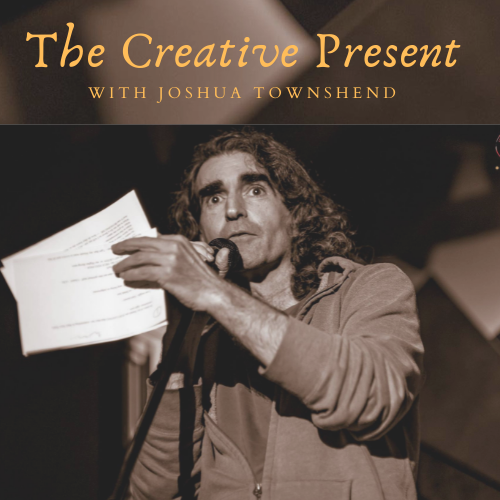Welcome to the creative presence, a show that’s dedicated to expanding your creative self expression. And at the same time getting your projects done. And I’m your host, Joshua Townshend. There’s a huge difference between characters. And people. Let me explain. You see, characters are created. And human beings are real people that have hopes and dreams, and have agendas that they want to have succeed. People are very specific, because people have an agenda. People want something, and then they go after to get what it is whatever it is they want. And because they’re people, and they don’t necessarily limit themselves by this preordained character that we creatives, you know, carve out, there is more opportunity for people to have more range. So let me give an example. Let’s say I have a five year old son, and I’m trying to put my five year old son to bed, okay. And, you know, within this relationship that I have, with my five year old son,
I have a huge, a huge range of how I can express myself, in order to facilitate getting my son to go to sleep. So I could play the role of the good parent, I could play the role of the bad or evil parent, you know, the authoritarian, I could play the role of the entertainer and, you know, do charades or the role of the master storyteller and read them this amazing, you know, favorite story of theirs that they’d love to hear as they drift off to dreamland, you know, I could play the role of, of the spoiled child, I could play the role of the good, you know, the angel, I could play the role of the devil I could play there, I could play the role of anything, because within my relationship of a five year old, son, there’s a very wide range. Now, if I’m the same person, and that same person goes to a bank, in order to get a bank loan from a loan officer, within that relationship, within that environment, within that context, within that agenda that I have, in order to achieve, of going through this interview process, or having this meeting in order to get my loan from the bank, the amount of roles that I have at my disposal in order to achieve my agenda are limited. You know, I’d want to be conscientious I would want to be smart, I would want to be together, I would want to be dependable. I’d want to show up on time, I but my range of expression is going to be within a certain frame. So it’s really contextually driven as a human being as a person as to what do I want to achieve my agenda, and then I play out these roles in order to achieve the thing that I want. And it’s true, some people in life have more range, more possibilities, but it’s also based on who they’re talking to, and what it is that they want. There’s a very a lot of variables, the police officer, as as a police officer at work, then yes, that range is most likely going to be smaller. But if we look at the police officer within his whole life, then there’s going to be more range because there’s more different kinds of interactions, not just professional. Now characters, we have the actor, writer, producer, director, storyteller, we have preordained these characters with a certain kind of behavior. And we are very slow to allow our characters to go outside that range of predetermined behavior. Because we call a no that’s not in their character that is in their character. But it’s not really about character in real life. In real life, it’s about having an agenda and and playing the role of whatever we need to play in that moment or do to achieve what we want and that’s the part that is the part that we sometimes leave out in our creative process. So I want to really want you to take a look at that this week. Take a look at how you show up. Take a look at the range of expression that you have in day to day life and and the different roles that you adopt if even for a moment to achieve what it is to get what it is that you want your agenda. So this week’s assignment, if you choose to play is to go into a day to day encounter at the post office, at the bank, at the grocery store, with someone that you know someone who you’re involved with romantically or professionally. And not only notice the different kinds of roles that you play within your relationship based on what it is that you want. But also go to your edge and see how much more you can open up to in play and expand that range as much as possible. And then take that same awareness and bring it to your work, bring it to your projects, and see where you can go. One of my favorite sayings is bring more character to your characters. Because your characters have a lot to say they have a lot to reveal. And if we keep them in their tight little description, box, their breakdown, really look at what role your character is playing in any scene or any beat and see how much range and openness you can allow them, you can give them or they can share with you, as the creator really open up to that idea that your character is a person and this person wants to have this experience. And what are they willing to do or say, in order to have that experience, given the imaginary circumstances, the context and the relationship? So that’s it for this week. Have a super creative time doing whatever it is you’re doing. Keep it real, keep it fun, and most of all, keep it really fun.
Thank you for listening. If you love what you’re listening to please subscribe and then share with fellow creatives. For more, go to www.Joshua townshend.com
SUMMARY KEYWORDS
role, character, range, play, order, agenda, preordained, relationship, creative, achieve, creative self expression, master storyteller, police officer, person, life, creative process, role of roles, role playing, type casting, feature film, casting, story is the thing, story, creative life






